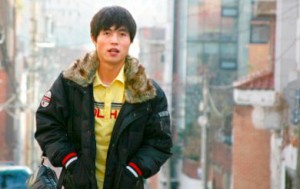Special to WorldTribune.com
By Donald Kirk, East-Asia-Intel.com
WASHINGTON — Shin Dong-Hyuk has an unequivocal message for anyone contemplating a trip to North Korea: Don’t go, you’re only aiding and abetting a money-hungry regime.
Shin, who remains the only person to have escaped from North Korea’s notorious Camp 14, offered that blunt view at a session staged here by the Foreign Policy Initiative, a moderately conservative think tank. In a conversation interpreted by Henry Song of Suzanne Scholte’s Defense Forum Foundation, Shin said that he’d been known to have “cussed out the people who go into North Korea as tourists.”

Shin’s remarks may seem somewhat harsh, but he offered scathing comments that get at the heart of the issues and questions surrounding my own trips there. He had “heard a lot of Europeans, and some from the United States” had gone, he said, taken on guided tours as if “they’re visiting a zoo looking at the animals.” Tourists “go with fascination” but “cannot hear the cries of the people who are suffering.” Visitors need to know, he warned, that the money they spend on trips to North Korea goes into the coffers of the ruling elite.
If the message is tough, no one denies that visitors to North Korea go nowhere near the camps. On a 12-day visit in July, I was never out of sight of a tour guide other than to wander around the cavernous lobbies of the hotels where we were staying. The only conversations anyone had were with people reciting from carefully prepared scripts and notes.
It’s not hard to see why Shin looks with revulsion on such displays. He recounted indescribable suffering as vividly as when I first met him at the Seoul Forum Correspondents’ Club more than five years ago. Shin by that time had put down his experiences in a manuscript in Korean that later formed the basis for Blaine Harden’s book — “Escape from Camp 14.”
Shin, 24 then, is 30 now. He wears a striped necktie, white shirt and a blazer, all of which make him appear like a Korean office worker, not a defector who was born in the camp from which he escaped at the age of 23. Although it’s difficult to connect his latter-day image with his appearance years ago, his description of all that he endured has not changed.
“Our meal was corn-based with insects and rats to supplement our diet,” he said. “We never doubted this sort of existence. For me it was an acceptable thing to do.” If an inmate “wanted to catch a rat and eat it, he had to go to the prison guard for permission.” The word of the guard was law: “The guard would order the rat to be eaten in front of us. For all of us, it was an acceptable thing. Any time an inmate disobeyed the rules, punishment depended on the mood of the guard. We were denied food, severely beaten — or publicly executed.”
The memories remain as fresh to Shin today as they were when he got out of the camp in 2005, breaking through an electrified fence. As a celebrity, the central character in a sensational book, Shin has grown accustomed to foreign lifestyles, foreign food and the fame that his story has brought him but cannot get over the indifference he finds to the horrors of life in the North Korean system.
Shin senses “among the young generation in South Korea there’s been a slow change in the way they view human rights in North Korea” but believes the government and politicians in the national assembly “show no interest.” He decided to speak out before foreign audiences after finding “no possibility of hope or concern about North Korea” in South Korea.
Shin appeals to American audiences with comparisons to the slaughter of six million Jews during the holocaust in Europe that ended only with the defeat of Nazi Germany. On a visit this week to the Holocaust Museum across the mall from where he was talking, he said he had had to deal with “the question of why, when we knew about the existence of the camps, did we not bomb the railways to the camps.”
That’s a question that haunts Americans even though most people were born after the war had ended. If the U.S. government was aware of the program of genocide ordered by Adolf Hitler, why did U.S. warplanes fail to cut off access to the camps? One answer has always been that the U.S. first had to wage war against the German army and did not have the resources. In fact, however, destruction of the infrastructure surrounding the Nazi prison camps would have been only a minor diversion.
The United States in the years since then has missed numerous chances to stop the slaughter of millions. Shin cites the period of the Khmer Rouge slaughter in Cambodia in the late 1970s in which two million people were killed. “What did we do,” he asked rhetorically. “Even in Kosovo, when tens of thousands were getting killed, did we take action?”
Shin’s mission now is “not to shed tears for those who have died but to save the people who might get killed.” Otherwise, he believes, “the process will be repeated over and over again.” The lesson is basic — those who ignore history are bound to repeat it.
